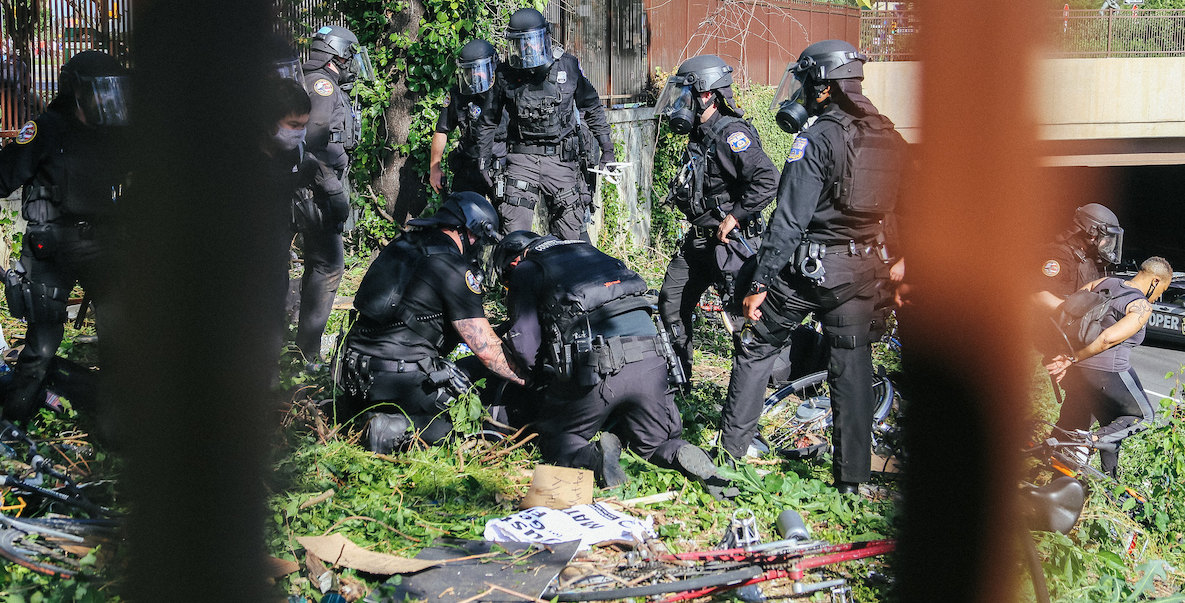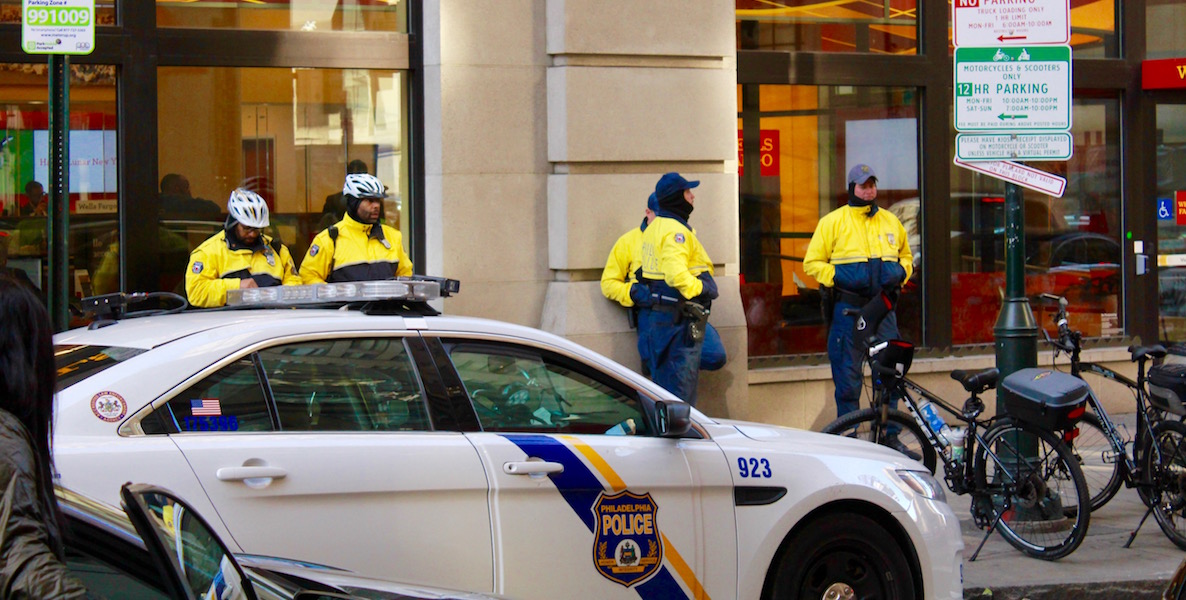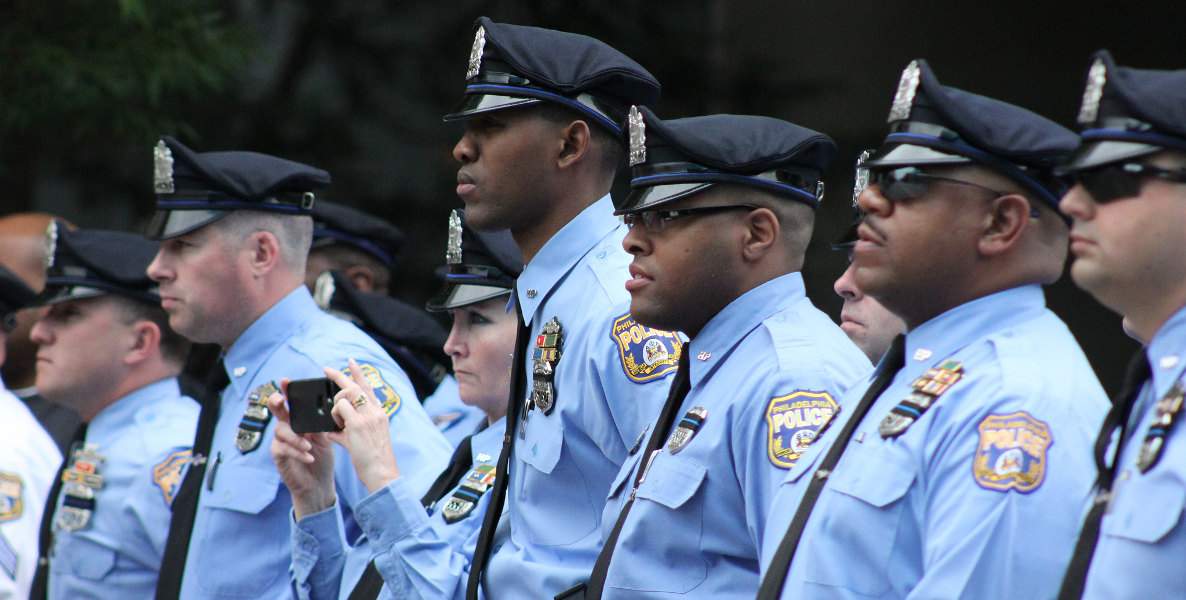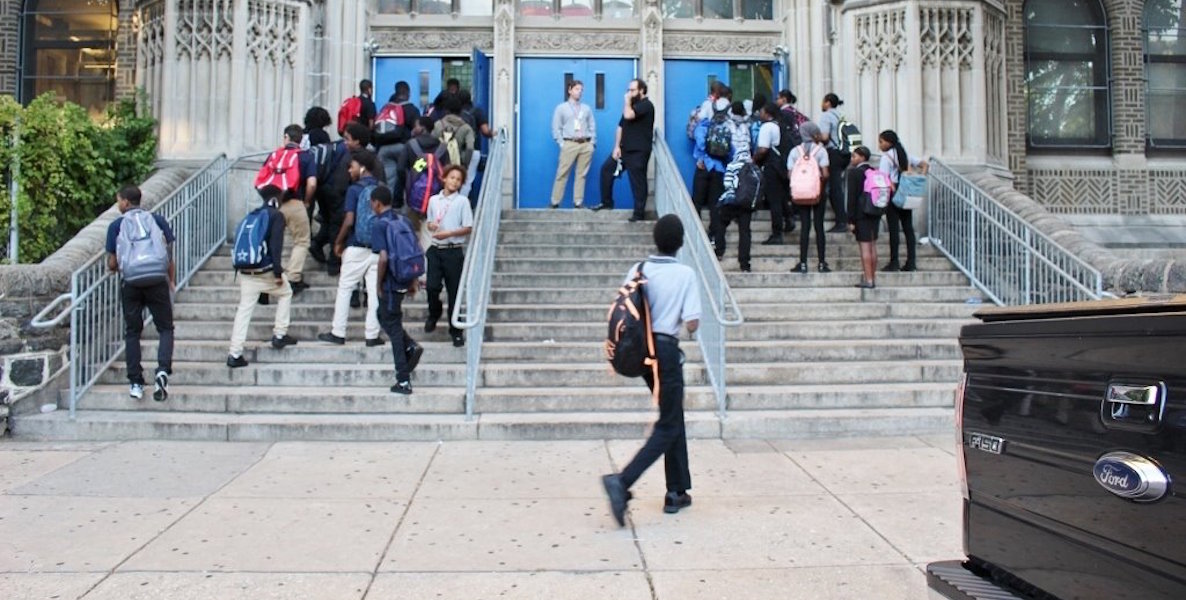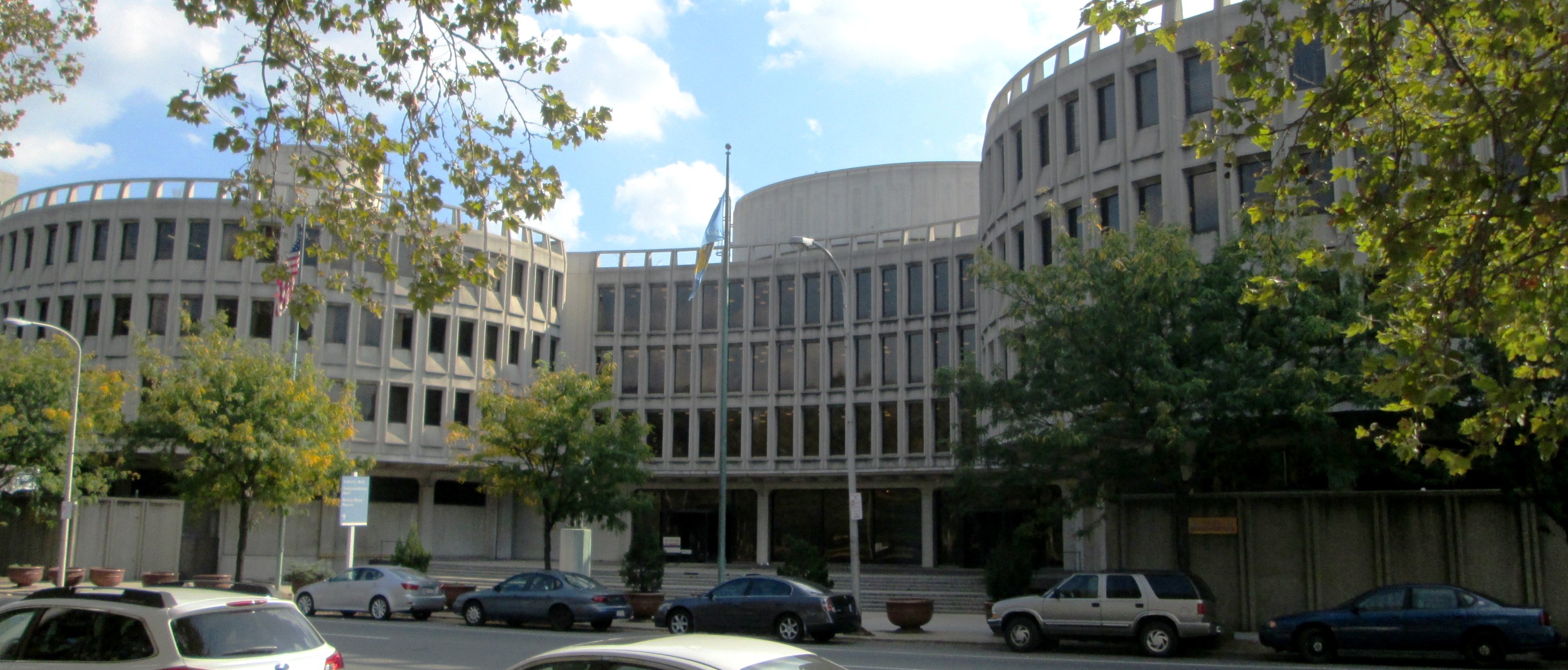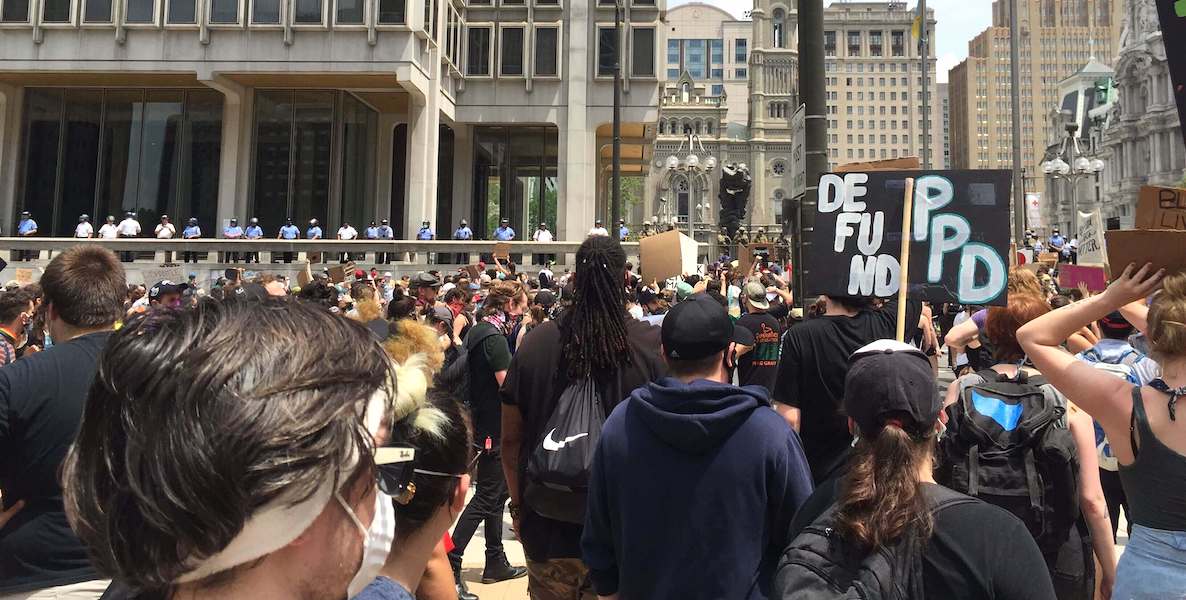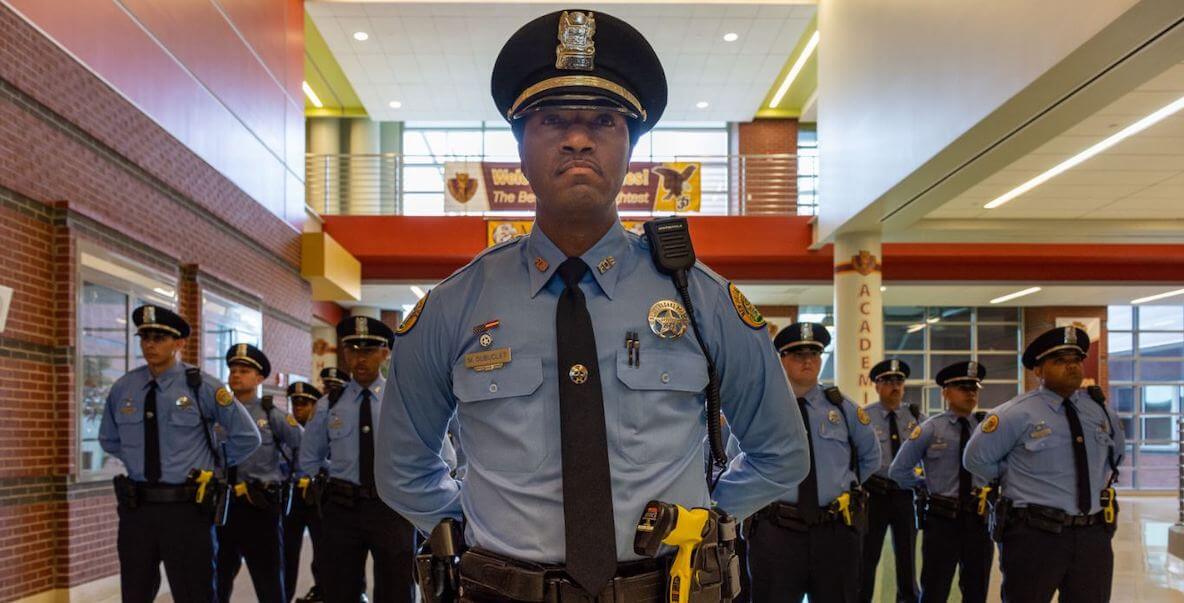During local TV news coverage of one of the Philadelphia rallies, a Black Lives Matter protester was asked by a reporter what reform he was marching for. His answer was quite specific: “We want a 50 percent cut in the police budget,” he said, before calling for that money—roughly $375 million—to be diverted to affordable housing, homelessness services, and other safety net programs.
![]() He’s not alone. Across the nation, the “Defund the Police” movement is picking up steam, as a type of primal-scream reaction to the police brutality playing out in real time on screens throughout the nation. But, as with most sloganeering, it’s never clear precisely what the phrase means.
He’s not alone. Across the nation, the “Defund the Police” movement is picking up steam, as a type of primal-scream reaction to the police brutality playing out in real time on screens throughout the nation. But, as with most sloganeering, it’s never clear precisely what the phrase means.
The young protester I saw on the news viewed defunding the police as a way to increase spending on social programs—not exactly a new idea. It represents a type of return to Great Society thinking, when big investments were made in top-down programs aimed at helping the poor. (While programs like the Earned Income Tax Credit were unqualified successes, and poverty among senior citizens was vastly reduced, the nation’s poverty rate when LBJ began the War on Poverty stood at 19 percent and, after the spending of $6 trillion, it was 12.4 percent last year. According to Columbia Unversity’s Center on Poverty and Social Policy, it could rise to 18.9 percent by year’s end as a result of the pandemic).
But here in Philly, our funding of police hasn’t dwarfed social service spending, as it has in other cities. Roughly 6 percent of Philadelphia spending goes to police, compared to cities like Memphis (13 percent) and Los Angeles (11). According to the non-partisan Urban Institute, spending as a percentage of direct general expenditures by state and local government on police has remained remarkably consistent, at just under 4 percent between 1977 and 2017.
All this “Defund the Police” talk actually diverts us from that which needs the most urgent attention: The culture of brutality that pervades policing, and the systemic racism that still defines the institution.
In Mayor Kenney’s initial 2020 budget, funding for police and for social service programs like homelessness, public health and human services were basically the same, roughly $750 million, respectively. Turns out, our 25 percent increase in city spending these last four years hasn’t gone to police at the expense of the safety net.
Others who chant “Defund Police” are suggesting that a good portion of the dollars saved by cutting police budgets be funneled into deploying trained, unarmed social workers to handle the interactions that dominate so much of police officers’ time—mental health interventions, engaging the homeless, handling run-of-the-mill disturbance calls.
There is some precedent for this as a promising reform: For over 30 years, a program in Eugene, Oregon called CAHOOTS—Crisis Assistance Helping Out On The Streets—has dispatched community-based crisis program first responders who are not police to address disturbances where crimes are not being committed. But it also serves as an implied surrender, an admission that our cops are too brutal, too lacking in deescalation skills, to be trusted to respond peacefully and constructively to everyday citizen complaints.
Still others are calling for literally abolishing the police, though they’re vague about next steps, particularly when queried about the inevitable scenarios as a result: Private police forces in well-off areas that are accountable to no one, and justice meted out by gangs on the street in distressed neighborhoods.
These are interesting debates to have, no doubt, but don’t they get us further and further away from addressing the problems we’re actually trying to solve for today? After all, we know what makes for successful law enforcement; community policing, focused deterrence, and data-driven strategies like Compstat have all led to record low crime rates.
![]() Banning chokeholds, demilitarizing departments and embracing real transparency around officer disciplinary history are indeed reforms we need right away. But, while thinking critically about how best to deploy resources is important, all this “Defund the Police” talk actually diverts us from that which needs the most urgent attention: The culture of brutality that pervades policing, and the systemic racism that still defines the institution.
Banning chokeholds, demilitarizing departments and embracing real transparency around officer disciplinary history are indeed reforms we need right away. But, while thinking critically about how best to deploy resources is important, all this “Defund the Police” talk actually diverts us from that which needs the most urgent attention: The culture of brutality that pervades policing, and the systemic racism that still defines the institution.
“Within a police force, culture eats policy for breakfast,” Scott Thomson, the former Camden police chief, said in a fascinating New York Times roundtable discussion last week. Culture, Not Policy ought to be the war cry going forward, as it was for Thomson (and his successor, Joe Wysocki), who turned around the Camden police force.
The Camden about-face is proof that a less-funded Minneapolis police force would not have necessarily removed that knee from George Floyd’s neck. But changes to the culture of that institution may well have.
Here in Philly, what all those marchers should be protesting—by name—is John McNesby and the Fraternal Order of Police. Because we just might have the most regressive, most uncivil, most morally bankrupt police union in the country.
That’s why I’ve written about EPIC—Ethical Policing Is Courageous—a peer intervention strategy that, along with an Obama-era Justice Department consent decree, has turned around the New Orleans Police Department.
And that’s why the work of the Center For Policing Equity is so important; founded by self-described “Justice Nerd” Dr. Phillip Atiba Goff—a Philly dude!—the Center has worked with Google engineers to develop COMPSTAT for Justice—tracking police stops, use of force data and survey results to “hold departments accountable to shared values of fairness.”
These innovations notwithstanding, the biggest impediment to police culture change still comes from within—from police unions. Which is why the “Defund” slogan is so off-note.
Here in Philly, what all those marchers should be protesting—by name—is John McNesby and the Fraternal Order of Police. Because we just might have the most regressive, most uncivil, most morally bankrupt police union in the country.
In the last week or so, we’ve seen some police unions step up and get on the right side of history. The three largest ones in California announced a reform agenda and a pledge to find racist police officers and “root those individuals out of the law enforcement profession.”
![]() It’s a real plan to unearth and jettison rogue cops—and not to, Rizzo-like, reflexively defend illegal or uncivil behavior at all costs, which has always been McNesby’s game. To McNesby, cops are never in the wrong, which is why it’s virtually impossible for a reform-minded police commissioner to punish those who are. The FOP has undue influence over the disciplinary arbitration process; in the past, McNesby has boasted of a 90 percent success rate when challenging punishments.
It’s a real plan to unearth and jettison rogue cops—and not to, Rizzo-like, reflexively defend illegal or uncivil behavior at all costs, which has always been McNesby’s game. To McNesby, cops are never in the wrong, which is why it’s virtually impossible for a reform-minded police commissioner to punish those who are. The FOP has undue influence over the disciplinary arbitration process; in the past, McNesby has boasted of a 90 percent success rate when challenging punishments.
“It’s very hard to maintain discipline in a police department, especially when at every turn you have cases that wind up getting overturned,” former Commissioner Charles Ramsey said on CNN last week.
This state of things, of course, pre-dated McNesby, who has headed the FOP for the last eight years. In the early aughts, a late-night, beer-swilling off-record session with then-Commissioner John Timoney, now deceased, had my jaw on the floor, as he walked me through case after case of the miscreants he’d had no choice but to reinstate.
Nothing will ever change, I remember thinking, unless cops broaden the aperture of their lens and look beyond their own perks when considering new union leadership.
So it was no surprise that, when video surfaced of officer Joseph Bologna, Jr. assaulting a protester, resulting in his suspension with intent to dismiss, there was McNesby, actually printing and hawking T-shirts in defense of the disgraced cop.
Or that, once Mayor Kenney and Commissioner Outlaw announced they’d be conducting an outside, independent review of the department’s response to the protests, McNesby, Trump-like, ratcheted up the rhetoric, calling it a “new low” for the “second-guessing of police” and suggesting that “what this city needs is an ‘independent consultant’ to find real leadership for a city currently controlled by cowards and frauds.”
In Camden, where reform was all about ultimately disbanding a police union that stood in the way of progress, and in New Orleans, where ethical policing is a revitalized force’s mantra, we see powerful reform success stories.
In a city known for its stubborn allegiance to the outworn status quo, McNesby outdoes all in resisting common sense change. Five years ago, when then-mayoral candidate Lynn Abraham embraced the findings of President Obama’s Task Force on 21st Century Policing—community engagement, de escalation, implicit-bias training—McNesby set out to torpedo her candidacy.
Keep in mind who the candidate was: This was former District Attorney Lynne Abraham, long the nation’s “toughest” old-school prosecutor. Her embrace of Obama’s reforms had a Nixon-to-China feel to it. Only Nixon didn’t have true believers so far to his right working to undermine his—and the nation’s—progress.
In addition to the FOP’s impeding of reform, McNesby has lowered the tone of civic discourse to levels on a par with the orange-haired 2016 presidential candidate his union endorsed. (Seriously? In a city with a registered 8 to 1 Democrat to Republican ratio?) Three years ago, defending to the hilt an officer who had shot and killed a fleeing Black suspect in the back, McNesby referred to Black Lives Matter protesters as a “pack of rabid animals.”
![]() Besides standing for the wrong things, and standing in the way of good things, it’s how he acts that is most corrosive—his lack of empathy and kindness, his dark view of humankind. Last year, when it came to light that some 300 Philadelphia police officers had posted vile racist and misogynistic messages on Facebook, there was McNesby, pooh-poohing: “People say racist Facebook posts, do we know they are racist?” he said. “There may have been a few. A lot of this stuff though I think is just cops being cops and venting.”
Besides standing for the wrong things, and standing in the way of good things, it’s how he acts that is most corrosive—his lack of empathy and kindness, his dark view of humankind. Last year, when it came to light that some 300 Philadelphia police officers had posted vile racist and misogynistic messages on Facebook, there was McNesby, pooh-poohing: “People say racist Facebook posts, do we know they are racist?” he said. “There may have been a few. A lot of this stuff though I think is just cops being cops and venting.”
No wonder we have the Guardian Civic League, a union for Black officers. If you were Black, would you want to pay dues to the FOP?
Unwittingly, McNesby raises the central question facing us: Cops being cops. Is a brutal, “us versus them” culture just who cops are, as those calling for the defunding of departments suggest?
There’s enough evidence to the contrary. In Camden, for example, where reform was all about going around, and ultimately disbanding, a police union that stood in the way of progress, and in New Orleans, where ethical policing is a revitalized force’s mantra, we see powerful reform success stories.
What would it take to tell that story here? A leadership class that is not afraid to shame and demand better of its police force by putting pressure on its union in the court of public opinion.
Keep in mind: Criticizing McNesby and his backwards ways is not being anti-police. Maybe if business leaders, the mayor, the police commissioner, prominent labor leaders, and other bold-face name Philadelphians (sports stars?) publicly demanded better from the FOP, the rank and file would demand change.
In the meantime, you can pass as many bans on chokeholds as you like, but as long as police unions can control how bad acts are or are not dealt with, you won’t be transforming many para-military organizations. Because, as it stands now, McNesby and the FOP still have political clout. If you protest anything, start with that.
Photo by Katherine Rapin


